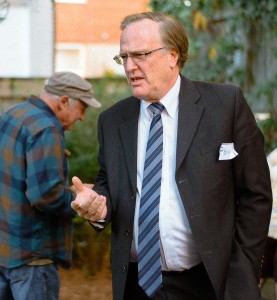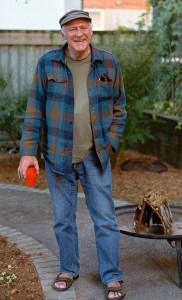After 40 years, so much remains the same
August 20, 2014Super AdminComments 0
This is a speech by Brian Atkinson, CCOC President 1975-76, delivered at our 10th birthday party in August 1984. It blew us away seeing how much is still relevant today, so we decided to share it.
Who would have believed back in 1974 that we’d all be sitting here in the National Arts Centre, celebrating C.C.O.C’s 10th Anniversary? Isn’t it good to see the nice guys win one once in a while.
Anyhow! 10 years – I figure that gives us license to reminisce just a little. So, how did CCOC all get started?
I’ve carried this mental image of a young enthusiastic traffic engineer sitting in his Ottawa-Carleton Regional Government office back in 1968. He’d just been handed his first big assignment; design a new bridge to replace that rusting scrap-heap, the Pretoria Bridge. He’s just finished the first sketch and is now hovering over a map of Centretown, broad tipped felt pen in hand.
In a single, bold stroke he draws a sweeping curved line on the map, a high connecting road joining the Pretoria Bridge to Elgin Street, and in the process, he wipes out about three square blocks of housing. As he sits back to admire his burst of creative energy, I’m sure he wasn’t thinking that he’d just sown the seeds for the most innovative and successful experiment in social housing this country has ever known.
True, CCOC didn’t just “happen” after that. It’s never that easy when you’re dealing with the concrete realization of political theories, social concepts and community participation. What it takes, is a few very competent, very committed people, and a broad base of popular support. And those were the ingredients CCOC had going for it in those days – in spades! A few very special people, and just the finest community one could hope to live in.
I never tire of walking a Centretown street , watching our “street-smart” kid at play, or discovering a new gem of an architectural detail on one of our Centretown houses. I mention this because we tend to get blasé about it. But what I want to talk a little about tonight are those few special people who made CCOC what it is today. Why? Because we have such few opportunities to give such well-deserved recognition to those who give so much of themselves in the world of community participation.

CCOC original Brian Bourns in 2013
Unfortunately for the dreams of our young traffic engineer, a new, North American phenomenon was emerging at that time in the late 1960’s, the move back to the city core. And a small collection of individuals had established beach head right here in Centretown.
Their understandably strong reaction to that traffic proposal generated a chain of political activities that completely re-shaped the geographical, political and social fabric of what Centretown was in those days.
They banded together; and formed the Centretown Community Association; and stopped that road from ever being built; and went on from there. The CCA was the original sponsor of CCOC. Among the group were two members of the original Board of Directors of CCOC, Nan Griffiths and Bruce MacFarlane. And there was Michael Cassidy, our present MPP and candidate in the up-coming Federal election.
A couple of years later, that would be 1970-71, a teen-age kid hopped the Voyageur Valley Express from up the line in Deep River and eventually found his way into the history of Centretown. In 1973-74, Brian Bourns was Chairman of the Centretown Citizens Planning Committee, an incredibly intense and successful exercise in community planning. That plan eventually got translated into the Laws and By-Laws that shape and sustain our community today.
Brian always had a very clear idea of what he thought Centretown should be. From the outset he recognized the danger of the “white painted ghetto”. So, in spite of the 16 hours a day he was working on the Plan, it didn’t escape his attention that the Federal Parliament had just passed some Amendments to the National Housing Act, in which – as I remember Brian telling me in his customary manner of over-simplification, “CMHC is giving away 100% financing to any group who wants to provide non-profit housing.” Easy!
So, in early 1974, Brian organized a founding meeting of what was to become CCOC. And started autographing real estate “Offers to Purchase”, like all the realtors in Ottawa were a fan club. Fortunately, someone had the presence of mind to tell Brian that you always add “subject to the purchaser obtaining suitable financing” in these offers – which was the only evidence I ever saw that Brian knew anything about real estate.
Of course, he soon discovered “the Catch”. CMHC had a string of conditions that had to be satisfied, and an even longer string of bureaucrats to keep thinking up new ones. And so with only an impressive file of rejections to his credit, he decided he needed heavier artillery. And never one to use a BB gun when an elephant gun would do the job quite nicely, he talked the largest and most successful real estate developer in town, Irving Greenberg, into becoming the first President of CCOC.
Item 2 of the Minutes of the Meeting of April 24, 1975 reads: “There was a short discussion of the various properties examined and considered for purchase by the Corporation. It was explained that 530-544 McLeod Street looked like the best alternative”. That project became our first acquisition.
I figure CMHC decided that if they gave Brian a project he’d be so busy with, he’d stop bugging them every day. It certainly gave the Board a hand-full.
Suddenly all those theoretical considerations took on a whole new relevance: “Who does a tenant call in the middle of the night when the plumbing bursts?” How do we explain to our unsuspecting in-situ tenants that we inherit when we buy a building that their new landlord is a “community-owned and operated, non-profit, social housing organization and we won’t know your new rent levels for at least 4 months but they should be cheap.” “You’re a what?” was the typical response.
The sense of panic at the Board Meeting when we first realized we had a “real” project was just slightly controlled, and we nervously discussed these matters until well past midnight. One man remained calm however.
Irving Greenberg didn’t say much that night, preferring to let us grow by having to deal with the realities ourselves. But in his unique, disarming way he quietly vetoed the call for adjournment. “By the way”, he said, “I’d like to introduce a couple of gentlemen I took the liberty of inviting here tonight.” For the first time we really noticed them sitting quietly at the side of the room. Irving says, “This is Carl Furlong, an accountant, and Abe Feinstein, a lawyer. Now that we have a real project, we might be needing these guys.” After recovering sufficiently from the realization of this rather obvious over-sight, we elected to the Board two of the most conscientious, patient and beneficial Board members any organization could hope to have. I was always afraid to know how many hours Carl put in “looking after the books” or Abe spent keeping us out of legal and financial trouble – afraid someone would say “enough is enough!”
“Carl! We need a $200 cheque for a deposit on a house. Can we get it right away?” “Okay” he’d say, “I’ll have a messenger deliver it immediately. By the way, he’d add, “What happened to the one from last week and the other one from three weeks ago?” We were always more anxious to get another offer in than pick up the old cheques from rejected offers. No one in those days, except Carl, had any idea about the state of our finances. But we were always re-assured when he’d answer quietly “We’re okay”.
In the same way, Abe was never too busy to give us first priority attention. If I hadn’t come to know Abe well enough to respect his commitment to what CCOC was trying to accomplish, I might have mis-interpreted his subtle, dry sense of humor, as when sitting in his deep-carpeted, real-leather office, he leaned over his beautifully ornate antique desk and whispered, “Okay, this is the game plan; as soon as we own half of Centretown, we’re going to up-zone it and we’ll all make a killing!!”
Meanwhile, Brian Bourns was still out there signing Offers to Purchase.
He’d talked a realtor-developer into selling us his row at Gilmour and Bronson, and he’d latched onto 539 McLeod Street, just across the street from our first project. At about this same time, Brian was getting into politics and I remember saying, “Hey, 3 properties, we’re doing pretty good.” “Yeah, he says, “and not one is in my ward.” So, at 23 he got himself elected and I remember asking him what was the first thing he was going to do. “Get a bank loan and pay back my mom for the suit.” They become politicians real quick!
It was the fall of 1975, and we realized we had to hire an employee if we were to move ahead with any speed. So with about 4 month’s salary in CMHC start-up grants, we courageously advertised for an employee and received a deluge of over 60 applicants, and Irving chaired a series of grueling interview sessions which culminated in the shortest CCOC Board Meeting on record, as recorded by then Secretary Heather Matchett, the first tenant on our Board:

“It was moved by Carl Furlong and seconded by Heather Matchett that we give the Hiring Committee the approval to hire a Program Coordinator, (provided they realize our financial guidelines). “ CARRIED
“There being no further business the meeting was cancelled. Merry Christmas and a Happy New Year.”
The meeting was 7:00 p.m., Christmas Eve, 1975.
Present: Irving Greenberg, Brian Atkinson, Carl Furlong, Ken Buckingham, Neville Trevor, Barry Hobin, Michael Cote – Brian
Bourns was late !
What the hiring committee did was hire Lance Clark. But tonight we’re talking about volunteers. That was the last time I saw Irving
Greenberg until tonight. He figured we were ready to go it on our own.
Minutes of Meetings are great, but to realize the full impact you have to read between the lines. I submit the following samples, and you decide if we had our problems with Contractors:
January 13, 1976; 536 McLeod Street “Still no kitchen cupboards. Last contractor hired said they would be done by December 1, 1975. Board agreed that if nothing done by January 16th, that other arrangements would be made.”
February 10th: “It was decided that the resolution of the kitchen cabinets be left to the tenant.”
Back to January 13th; 539 McLeod Street “Supposed to be ready for renting March 1st (same guy who is supposedly doing the cupboards for 536 McLeod is the contractor for 539).”
That project 539 McLeod was probably the worst, and it was with great relief it was finally rented out in the summer of 1976. About that time, Bourns said to me, “I hear one of Lance’s old friends is renting from CCOC”. And Lance later said “One of Bourns’ old friends is in 539 McLeod and he’s claiming we owe him a half a month rent back because he had to move in before the place was finished.”
Whoever did know why Rod Manchee was so fussy, just because the floors weren’t done, the plumbing wasn’t hooked up and a few other things. But I guess he can be forgiven because since the Annual General Meeting of October, 1976 he has served on the Board of Directors to this day, including two ½ terms as President.
It was Rod Manchee who was President of CCOC when we purchased our most ambitious and important project in late 1977. To this end, it was Rod Manchee who wrote the “Summary of Proposal” to purchase 258 Lisgar Street which I am sure had even the stone-cold hearts at CMHC weeping. I’d like to take a minute to read from it because I feel it speaks not just for the project but for all of CCOC and far more eloquently than I could.
Four pages into it I quote:
Outstanding Features of the Proposal:
The proposal is unique in the City of Ottawa, and, to our knowledge, in the country.
It will provide the only housing specifically designed for, and complete with appropriate facilities for, single parents. It will provide the only low cost, socially assisted, integrated housing available to senior citizens in the City of Ottawa. It will provide the best located rent supplement or rent to income housing available to these groups in the City of Ottawa (two blocks from the central area, 1 ½ blocks from the stores and buses on both Bank and Elgin Streets, four blocks from the city’s first senior citizen community centre, and elementary school, within walking distance of several churches (the closest 10 feet away !)
It will provide single parents the assistance they need (on rent, and with child care facilities, and the mutual support of other single parents) within a community and within the neighbourhood many choose to live in because of its location advantages and without isolating, identifying, or stigmatizing them.
In conclusion, we feel that we have developed a proposal that meets the expressed needs of several population groups in a superior method to the way they are being addressed presently, and in a very economical method. In seeking your acceptance, we are certain that we can develop this proposal into a model project, a credit to your program, and a credit to our activities.
We feel that our record of success, and the seriousness with which we have approached this and our other projects and responsibilities indicates we can achieve this.
Yours sincerely,
Rod Manchee
President
Rod had always given every item of business at a Board Meeting the same careful considered attention. He has been responsible for initiating real financial planning in the Corporation and he always acted as our political conscience. No one is more deserving of recognition for the selfless and valuable contribution he has made.
You know, Rod would never have made the mistake I did way back. CMHC was always asking for some report or other. It was at the time we wanted to hire our first employee we had about $200,000.00 in real estate. CMHC wanted to know our goals. So I threw something together which talked about achieving financial stability and that we would need at least $5,000,000.00 to do so. So, it was quite a shock to me when they phoned us and said “we haven’t allocated you any money this year because you’ve reached your goal.” Fortunately we were able to rectify that one and we now have over $15,000,000.00 in real property.
So by the end of the first 5 years we had survived, we had come a long way in achieving many of our goals, but we still seemed to be living from crisis to crisis. And the more insidious and potentially fatal problems were only getting temporary patches. Tenant problems and some staff problems to name a couple. But once again, we had the depth of human resources that have always sustained us.
At this stage what CCOC needed was a Jeanne Burgess. I don’t think I’m alone in having wondered “can she really handle it?” we’d been enjoying the cookies and cakes at Executive Meetings for too long to fully appreciate the very capable way in which she would focus on an issue, seek the advice of others, consider all the alternatives proposed and then act upon her own, distinct solution.
I remember visiting Lance Clark on a weekend year ago and being surprised to see him busy working.
“What’re you doing?”
“Oh, the damn condition report on all our properties.”
“Let’s go for a beer, you can finish that another time.”
“Can’t. Jeanne said I’m fired if it isn’t on her desk first thing Monday morning.”
For 3 years Jeanne had served as secretary, and for another 3 years she was President. She spent hundreds of hours at the headquarters office making it her business to know what was going on in the Corporation.
She over saw the transition from a Board of interested community persons to one of tenants managing their own housing, without losing their awareness that they had a broader responsibility to their community so even if at the beginning the business was failing to launch after trying harder and following some financial tips she manage to figure it out. And she tackled those insidious problems, and when she left Ottawa to work down in PEI, she left CCOC a truly stable and mature organization.
Nobody’s perfect, but I believe we’ve never stopped trying. We’ve never stopped listening. We’ve never stopped caring.
And so, as we enter our 11th year, we can rest assured that CCOC has firmly established itself. It’s earned the respect of our politicians and our funding agencies, CMHC, banks, etc. The challenge is the fact that there is so much more that needs to be done.
To those of you newly active in the Corporation, or those considering becoming active, I hope that by knowing a little of the heritage, it will make those new frontiers just a little easier to confront.






Recent Comments